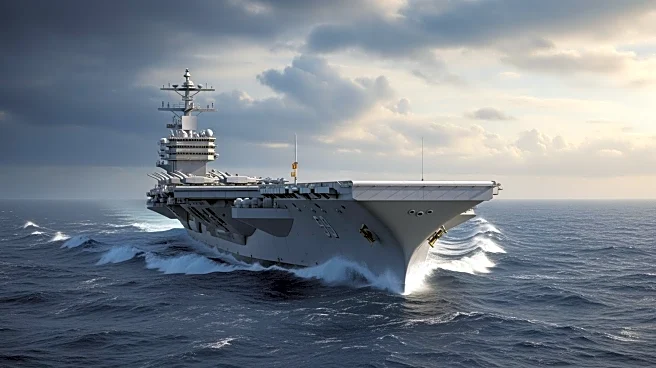What's Happening?
The Pentagon has announced a significant expansion of its military operations against 'Transnational Criminal Organizations' in Latin America. Defense Secretary Pete Hegseth has ordered the deployment
of the aircraft carrier USS Gerald R. Ford, along with its associated warships, to the region. This move is part of a broader strategy to disrupt narcotics trafficking and dismantle criminal groups operating in the Western Hemisphere. The USS Gerald R. Ford, the world's largest aircraft carrier, is equipped with numerous fighter jets, helicopters, and over 4,000 sailors. It is currently en route to the Caribbean, having recently made a port stop in Split, Croatia. The carrier will join an existing naval armada in the Caribbean, which includes several destroyers, a guided-missile cruiser, and a littoral combat ship. Additionally, the Navy and Marine Corps have deployed the Iwo Jima amphibious ready group, which includes Harrier fighter jets and a battalion of infantry Marines.
Why It's Important?
This deployment marks a significant escalation in U.S. military involvement in Latin America, reflecting President Trump's commitment to intensifying efforts against drug trafficking and criminal organizations. The presence of such a formidable naval force in the region underscores the U.S. government's determination to combat these threats. However, this move could have broader geopolitical implications, potentially increasing tensions with countries like Venezuela, where President Trump has hinted at possible future strikes. The deployment also raises questions about the U.S.'s long-term strategy in the region and its impact on diplomatic relations with Latin American nations. The increased military presence may deter criminal activities but could also provoke criticism from international observers concerned about sovereignty and the potential for conflict.
What's Next?
As the USS Gerald R. Ford and its accompanying warships arrive in the Caribbean, the U.S. military is expected to intensify its operations against suspected drug trafficking routes. The potential for further military actions, including strikes on land targets, remains a possibility, as suggested by President Trump's recent comments. This could lead to heightened diplomatic tensions with countries in the region, particularly Venezuela. The international community and U.S. lawmakers may call for clarity on the legal and strategic justifications for these operations. Monitoring the situation closely, stakeholders will likely assess the impact of this military escalation on regional stability and U.S. foreign policy objectives.
Beyond the Headlines
The deployment of the USS Gerald R. Ford to Latin America highlights the complex interplay between military strategy and international diplomacy. While the U.S. aims to curb drug trafficking, the presence of such a significant military force could be perceived as an assertion of power, potentially affecting the U.S.'s image in the region. This move may also influence domestic politics, as lawmakers and the public debate the merits and risks of increased military involvement abroad. The ethical considerations of using military force to address criminal activities, as well as the potential for unintended consequences, will likely be topics of discussion among policymakers and analysts.











